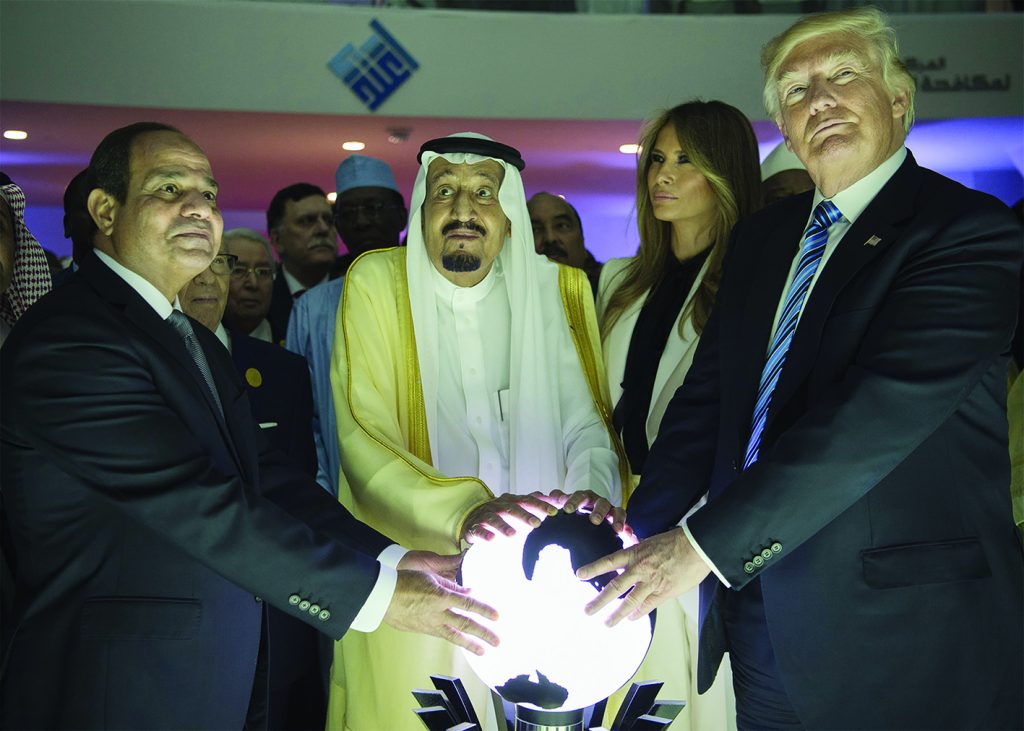
DUBAI: Brandishing a sword and dancing to traditional music on his first visit to Saudi Arabia soon after taking office, Donald Trump launched a dramatic relationship revamp that freed the hands of the Gulf states. More than three years on, regional leaders are playing their diplomatic cards in support of an erratic but valuable partner in Washington as he seeks a second term - one that would likely lead to even deeper tensions with Iran and more opportunities for their one-time enemy, Israel.
The businessman-turned-president's warm ties with the Gulf Arab states contrast with those of his predecessor Barack Obama, whose deal-making with Iran appalled archrival Saudi Arabia and its neighbors. As Trump trails in the polls against Joe Biden - Obama's vice president who would be expected to shift back to a more conventional stance on human rights and arms deals - the oil-rich region faces a delicate balancing act.
"The historic visit in May 2017 was the beginning of an exceptional relationship with a US president. It has opened many doors," a Gulf official close to political circles in the region told AFP on condition of anonymity. "Decision makers here would logically want those doors to stay open, but they aren't blind," the official added. "They are also getting ready for the other scenario."
On his first foreign trip as US president, Trump was given a hero's welcome in Riyadh. Far from accusations of collusion with Russia at home, he accepted a medal and addressed Muslim leaders -while vilifying Iran and muting rhetoric on human rights. His son-in-law Jared Kushner, a property developer and diplomatic neophyte, took the lead on the Middle East peace process.
"It pivoted the relationship between the US and the (Gulf) countries to be more about personalities, that of the president and his son-in-law, and less about institutions," said Randa Slim, director of conflict resolution at the Washington-based Middle East Institute. In the years that followed, Trump's unconventional and impulsive strategy produced a head-spinning sequence of signature achievements, risky moves and failed initiatives that have redrawn the Middle East's political landscape.
The US withdrew from the 2015 nuclear deal with Iran and assassinated its once-untouchable general Qasem Soleimani. It moved the US embassy to Jerusalem and wound back America's military presence in a region Trump believes has lost much of its strategic importance. The policies generally played well in the Gulf, despite a lack of action on major incidents like the unprecedented attacks last year against Saudi energy giant Aramco, blamed on Iran.
"Saudi Arabia and the UAE shared a perception that the Obama administration abandoned its traditional Gulf allies," said Elham Fakhro, senior analyst at the International Crisis Group. "Saudi Arabia has vastly improved relations with the Trump administration, owing in part to its decision to impose the 'maximum pressure' campaign" against Iran, she said.
As the 2020 presidential election has neared, Trump secured a major victory by sponsoring a deal between the UAE and Israel to normalize ties, giving the Jewish state an unprecedented foothold in the Gulf and forming a united front against their common foe, Iran. The small kingdom of Bahrain, politically and economically influenced by Saudi Arabia, also agreed to establish diplomatic relations with Israel. The timing of the deals, long considered taboo without the blessing of the Palestinians, was seen as an attempt to provide Trump with a foreign policy win ahead of the vote.
With Biden leading in the polls, now both the UAE and Saudi Arabia worry about a rollback on sanctions against Iran under a Democrat administration, said Fakhro. Trump was "also more willing to ensure that arms sales to these states moved ahead swiftly," and a Biden administration would be unlikely to be as accommodating, she added.
The White House has pushed back against anti-Saudi resolutions in Congress over its controversial Yemen war and the grisly assassination of Saudi journalist Jamal Khashoggi in Oct 2018. "A Biden administration will come with a foreign policy team that is ready to re-examine the underlying tenets of the US-Saudi relationship and will embrace a hard-line position on the Saudi leadership," said Slim from the Middle East Institute.
A Biden administration would most likely attempt to bring Iran back to the negotiating table and adopt more vocal rhetoric on human rights. "It would be a difficult thing for the Saudis, but at the end of the day, they would have to live with it," said Middle East expert James Dorsey. "It is going to be a difficult dance." - AFP











